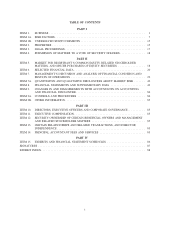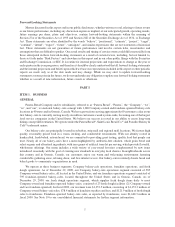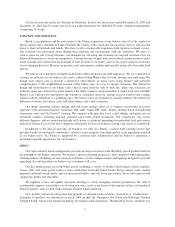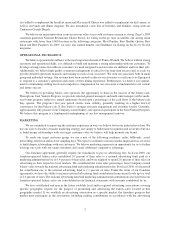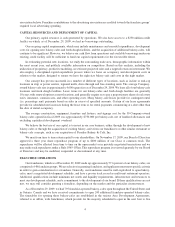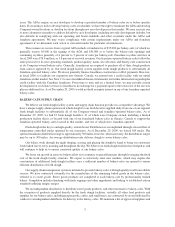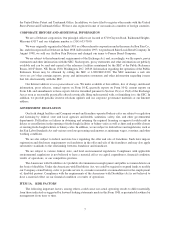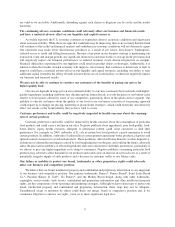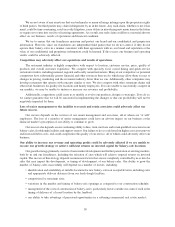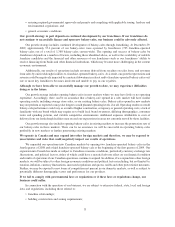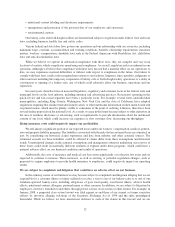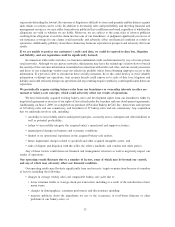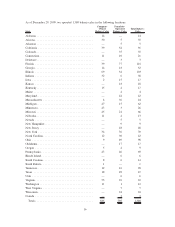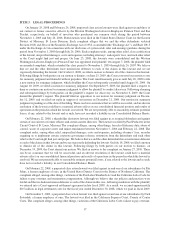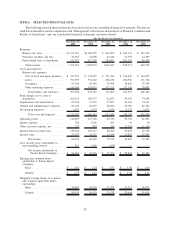Panera Bread 2009 Annual Report Download - page 16
Download and view the complete annual report
Please find page 16 of the 2009 Panera Bread annual report below. You can navigate through the pages in the report by either clicking on the pages listed below, or by using the keyword search tool below to find specific information within the annual report.We are not aware of any assertions that our trademarks or menu offerings infringe upon the proprietary rights
of third parties, but third parties may claim infringement by us in the future. Any such claim, whether or not it has
merit, could be time-consuming, result in costly litigation, cause delays in introducing new menu items in the future
or require us to enter into royalty or licensing agreements. As a result, any such claim could have a material adverse
effect on our business, results of operations and financial condition.
We try to ensure that our franchisees maintain and protect our brand and our confidential and proprietary
information. However, since our franchisees are independent third parties that we do not control, if they do not
operate their bakery-cafes in a manner consistent with their agreements with us, our brand and reputation or the
value of our confidential and proprietary information could be harmed. If this occurs, our business and operating
results could be adversely affected.
Competition may adversely affect our operations and results of operations.
The restaurant industry is highly competitive with respect to location, customer service, price, quality of
products and overall customer experience. We compete with specialty food, casual dining and quick-service
restaurant retailers, including national, regional and locally owned restaurants. Many of our competitors or potential
competitors have substantially greater financial and other resources than we do, which may allow them to react to
changes in pricing, marketing and the restaurant industry better than we can. Additionally, other companies may
develop restaurants that operate with concepts similar to ours. We also compete with other restaurant chains and
other retail businesses for quality site locations and hourly employees. If we are unable to successfully compete in
our markets, we may be unable to sustain or increase our revenues and profitability.
Additionally, competition could cause us to modify or evolve our products, designs or strategies. If we do so,
we cannot guarantee that we will be successful in implementing the changes or that our profitability will not be
negatively impacted by them.
Loss of senior management or the inability to recruit and retain associates could adversely affect our
future success.
Our success depends on the services of our senior management and associates, all of whom are “at will”
employees. The loss of a member of senior management could have an adverse impact on our business or the
financial market’s perception of our ability to continue to grow.
Our success also depends on our continuing ability to hire, train, motivate and retain qualified associates in our
bakery-cafes, fresh dough facilities and support centers. Our failure to do so could result in higher associate turnover
and increased labor costs, and could compromise the quality of our service, all of which could adversely affect our
business.
Our ability to increase our revenue and operating profits could be adversely affected if we are unable to
execute our growth strategy or achieve sufficient returns on invested capital for bakery-cafe locations.
Our growth strategy primarily consists of new market development and further penetration of existing markets,
both by us and our franchisees, including the selection of sites which will achieve targeted returns on invested
capital. The success of this strategy depends on numerous factors that are not completely controlled by us or involve
risks that may impact the development, or timing of development, of our bakery-cafes. Our ability to grow the
number of bakery-cafes successfully will depend on a number of factors, including:
•identification and availability of suitable locations for new bakery-cafes on acceptable terms, including costs
and appropriate delivery distances from our fresh dough facilities;
•competition for restaurant sites;
•variations in the number and timing of bakery-cafe openings as compared to our construction schedule;
•management of the costs of construction of bakery-cafes, particularly factors outside our control, such as the
timing of delivery of a leased location by the landlord;
•our ability to take advantage of perceived opportunities in a softening commercial real estate market;
10


